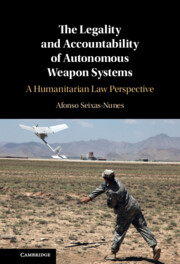Book contents
- The Legality and Accountability of Autonomous Weapon Systems
- The Legality and Accountability of Autonomous Weapon Systems
- Copyright page
- Dedication
- Contents
- Acknowledgements
- Abbreviations
- Introduction
- 1 Introducing Autonomous Systems of War
- 2 AWS
- 3 Autonomous Weapon Systems and ‘Autonomy’
- 4 AWS and the IHL Requirements
- 5 Accountability and Liability for the Deployment of Autonomous Weapon Systems
- Final Conclusion
- Index
3 - Autonomous Weapon Systems and ‘Autonomy’
Weapons or Killer Robots?
Published online by Cambridge University Press: 05 May 2022
- The Legality and Accountability of Autonomous Weapon Systems
- The Legality and Accountability of Autonomous Weapon Systems
- Copyright page
- Dedication
- Contents
- Acknowledgements
- Abbreviations
- Introduction
- 1 Introducing Autonomous Systems of War
- 2 AWS
- 3 Autonomous Weapon Systems and ‘Autonomy’
- 4 AWS and the IHL Requirements
- 5 Accountability and Liability for the Deployment of Autonomous Weapon Systems
- Final Conclusion
- Index
Summary
Chapter 3 has a more philosophical character as far as it seeks to understand the richness of the concept of ‘autonomy’ when applied to technology of warfare, in order to build a coherent and well-structured legal discourse. This concept is a multidisciplinary one, and it has different semantic values depending on the discipline. The chapter argues that computer language is immersed in a phenomenon named ‘misappropriation of language’. Thus, when arguing about autonomous systems, it is important to clarify that ‘autonomy’ should not be understood in the legal or philosophical way but rather as the capacity of an artificial system to develop tasks without human supervision. Once this concept has been clarified, the chapter examines the ontological argument that has been argued by some scholars and roboticists. That argument sustains the possibility of considering autonomous systems as legal agents, under the Latin maxim ‘qui facit per alium, facit per se’. The chapter explains why the legal theory of delegation cannot be applied to AWS and why AWS should not be seen as independent legal agents but rather remain within the category of weapons systems.
- Type
- Chapter
- Information
- The Legality and Accountability of Autonomous Weapon SystemsA Humanitarian Law Perspective, pp. 103 - 139Publisher: Cambridge University PressPrint publication year: 2022



